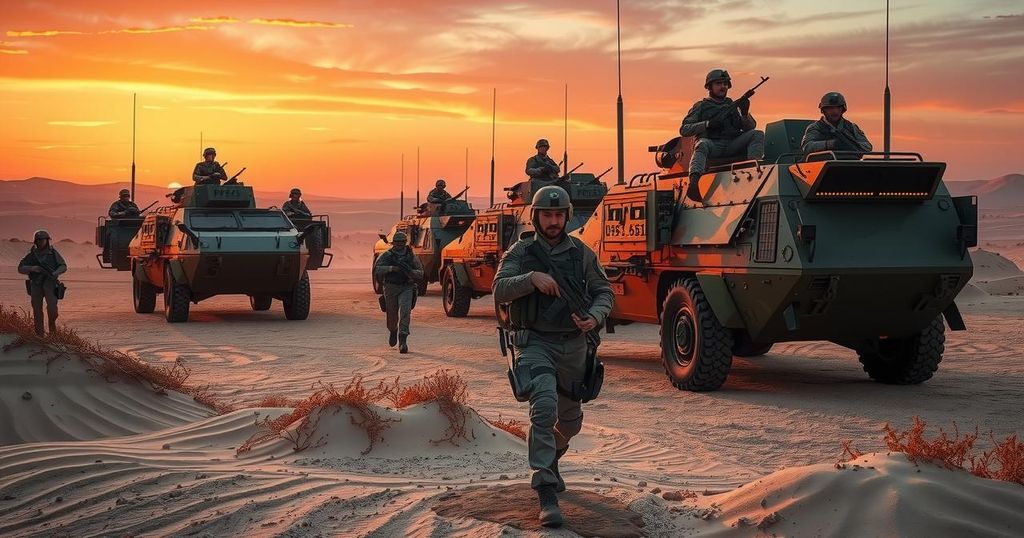Wagner Mercenaries’ Campaign of Terror in Mali: A Crisis of Violence and Displacement

Russia’s Wagner mercenaries are perpetrating violence in Mali alongside local military forces, leading to widespread civilian casualties and a worsening refugee crisis. Despite claims of tackling terrorism, the group is blamed for indiscriminate killings and brutality against non-combatants. The UN reports a significant increase in Malians fleeing to refugee camps in Mauritania, exacerbating an already desperate humanitarian situation.
In Mali, reports indicate that Russia’s Wagner mercenaries are orchestrating a wave of violence, contributing to a severe humanitarian crisis. Civilians describe chilling encounters with these groups, which are said to have massacred innocents and set fire to villages, leading to a rapid increase in refugees. Local herder Kossi ag Mohamed recounted a harrowing escape from his home in Timuktu, citing the overwhelming violence inflicted by Wagner forces, labeling their actions as catastrophic.
Initially working alongside the Malian military junta that came to power in 2020, Wagner’s presence in Mali has expanded since its partnership began in late 2021. With the group’s founder’s recent death raising questions about its future, Wagner’s operations persist, effectively functioning as an arm of Russia’s Defense Ministry and enhancing Moscow’s influence in unstable regions like West Africa.
Despite the Malian authorities justifying Wagner’s involvement as a means to counter separatist and militant threats, the brutal impact on civilians is alarming. Analyst Héni Nsaibia highlighted Wagner’s indiscriminate killings of all genders and ages during assaults on transport vehicles and civilian gatherings. Despite repeated requests, Russian officials and Wagner’s representatives have not commented on these allegations.
Malian men, fearing for their lives, now hide in trees during military convoys, only to find themselves collecting the bodies of their slaughtered compatriots afterwards. Videos captured by locals depict horrific scenes of death, further exemplifying the Chilling atmosphere caused by Wagner’s consistently violent tactics including killings and looting.
The Malian government reportedly pays Wagner approximately $10 million monthly, a relationship that has spurred allegations of intensified abuses. Analysts argue that the number of civilian fatalities linked to Wagner exceeded those attributed to Islamist extremists, marking a significant increase in violence exacerbated by the mercenaries’ presence that employs heinous methods such as torture and mutilation.
Mass displacement has become alarmingly prevalent with the Mbera refugee camp in Mauritania now housing about 149,000 individuals, drastically increasing due to recent violence. Many fleeing civilians attribute their escape to attacks from Wagner and the Malian government rather than from Islamist militants. Testimonies from refugees reveal a pattern of terror inflicted upon communities, sparking fear and desperation to leave their homes.
Exacerbated tensions between local extremist groups and Wagner have seen operations intensify in previously held civilian regions. Following the recruitment surge, satellite imagery indicates a bolstering of Wagner’s military capabilities in Mali, affirming the group’s expanded presence and their ongoing military actions which aim to intimidate the local populace further.
Unfortunately, refugees continue to face grave dangers even after crossing borders seeking safety. Many families arriving in Mauritania remain at risk, as instances of attacks by Wagner patrols on fleeing civilians persist, leaving communities decimated and vulnerable. Families are left to grapple with the impacts of violence, questioning their futures while navigating the dire circumstances thrust upon them.
The Wagner Group’s operations in Mali have escalated into a humanitarian catastrophe, with countless civilians suffering violent repercussions of their actions. Amidst claims of fighting against Islamist terror, the mercenaries have disproportionately targeted innocents, resulting in mass displacement and fear. The complex dynamics between the Malian government and Wagner raise serious ethical concerns and underline the need for international scrutiny and intervention to protect the affected civilian populations from ongoing atrocities.
Original Source: www.washingtonpost.com







